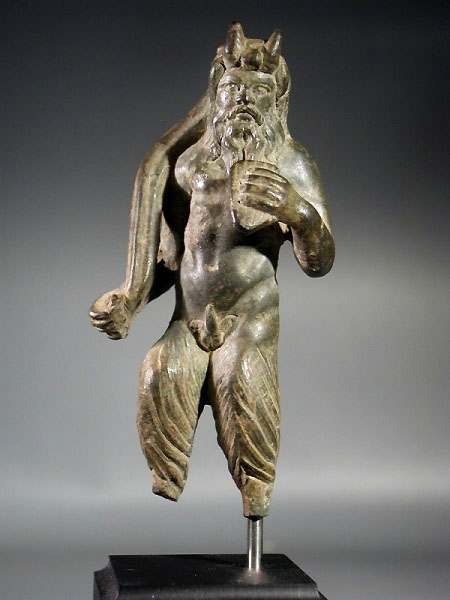Bronze statuette of Faunus, which follows the iconography of the Greek
god Pan, dating to about the I-II century A.D., now in the Sasson Ancient
Art Gallery, Jerusalem, Israel.
Among the Latins, Faunus was regarded as a god of the woods, protector
of shepherds and agriculture. The mythical tradition narrated that Faunus
was the son of Picus, the king with prophetic qualities, transformed
into a bird by Circe’s magic arts, and father of Latinus, the
first king of Latium. In the Aeneid (VII, 81-91), Faunus’s
oracular properties are described, saying that he was consulted in a
forest, near a sacred waterfall, where “breathes forth from her
darkness a deadly vapour”. The priestess, after having offered
sacrifices, laid over the skins of the sacrificed animals and fell asleep.
During her sleep she saw strange shadows flying and heard the voices
of the gods. The name of Faunus, indeed, seems to derive from the verb
fari (“to speak”, in an oracular sense, “to
pronounce inspired words”) and is etymologically related to fanum,
meaning a temple, or a sacred place, and its territory. The god was
therefore regarded as the one who inspired the ecstatic soothsayers,
those who acted as they were possessed by a god, a behavior the Greeks
called “enthusiasm”. This kind of “possession”,
of elation on the part of a divinity, was properly pursued in a sacred
place in the woods, in a fanum, and those who attempted to
execute such practices were called “fanatics” (Sabbatucci,
1988). Faunus’s behavior was thus characterized as “wild”
and “foolish”, in opposition to the behavior which was regarded
as appropriate for a Roman citizen in daily life: composure and the
full ownership of the rational faculties. In the same manner, Faunus’s
space, the pasture lands and the woods, was in opposition to the urban
space. From this point of view, the function of the god is very similar
to that of Silvanus, so much so that according to Dumézil (1974),
Silvanus could be considered one of Faunus’s aspects, silvicola
Faunus (Virgil, Aeneid, X, 551). The cited passage, however,
refers only to the fact that Faunus is an inhabitant of the woodlands,
without any explicit mention of Silvanus (Dorcey 1992).
[Image: http://www.pinterest.com/chereselw/ancient-art/]


